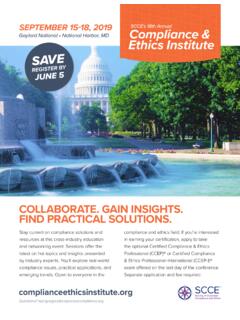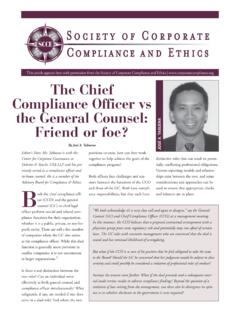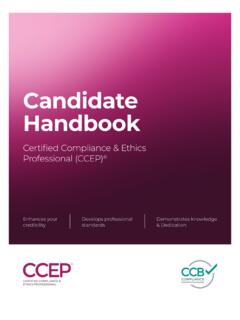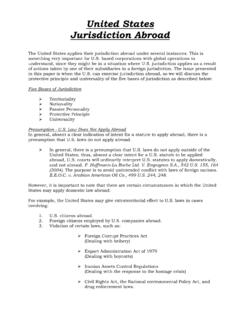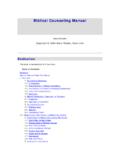Transcription of Guide to Conducting Workplace Investigations
1 Guide to Conducting Workplace Investigations Many companies, in addition to codes of ethics and conduct, have found it necessary to create investigation guidelines to assist employees from various corporate backgrounds law, human resources, audit, finance, etc. to conduct Workplace Investigations . In the current business environment, how companies investigate potential misconduct can affect that company s reputation almost as much as the alleged conduct itself. Consistent principles and procedures must be followed whenever allegations of misconduct are investigated.
2 Few people in a corporation are trained investigators. Even if you have business experience Conducting interviews and obtaining information from employees and others, you may not have actively participated in many Workplace Investigations . The techniques and goals of these Investigations are often different. This Guide gives you information and practical advice on how to handle an investigation effectively. It is true that every Workplace investigation will have unique issues, circumstances, dimensions, challenges and outcomes. But an investigation can cause serious harm if it is not conducted properly.
3 Following the Guide ensures that each of our Investigations is conducted in a professionally consistent manner and will yield the best results. These guidelines should be viewed as the umbrella standard for a Workplace investigation within the company. The Reasons for an Internal Investigation A Workplace investigation is conducted when there is credible information there may have been significant wrongdoing, misconduct or ethical lapses. An Workplace investigation may also be appropriate even if there have not been specific allegations against an employee or department, but there have been allegations against others, and the investigation is intended to exclude the possibility that wrongdoing occurred within the company.
4 An effective investigation process protects the interests of the Company and its shareholders by (i) preventing and detecting misconduct and violations; (ii) ensuring that corporate activities comply with applicable laws and regulations; and (iii) identifying areas of improvement for internal business operations. Therefore, an investigation is not conducted simply to uncover sufficient facts to justify a result or to just record somewhere that the incident occurred. An investigation is, in the first instance, fact-finding. Investigations determine, fully and credibly, what happened with respect to a particular incident whether suspected conduct did or did not take place; what the circumstances were; who was involved; whether a violation of law or company policy occurred.
5 An investigation must be perceived as having been thorough, independent and analytical. Meric Craig Bloch (2008). All rights reserved. 1 The Request from Compliance The Company s Corporate Compliance Department ( Compliance ) has primary responsibility to ensure that incidents of actual or suspected violations of the Code of Business Conduct (the Code ) are properly investigated. The investigation usually begins with a report of a possible Code violation to the Company Compliance and Ethics Line. Sometimes, a possible Code violation may be reported to us by another business unit.
6 Colleagues in key internal departments may learn of an incident when they are contacted by The Company associates or colleagues in the field. Some of these incidents need to be reported to Compliance. For specific guidelines for your department regarding the incidents to be reported to Compliance, please consult the attachments to this Guide . Once received by Compliance, the matter is reviewed by the Investigations Manager. The Investigations Manager is responsible for developing the investigation process and monitoring all Workplace Investigations , regardless of the internal department actually Conducting the investigation.
7 The Investigations Manager makes a threshold determination whether a formal investigation is needed. Some problems reported to Compliance may be resolved quickly and informally without an investigation. If no investigation is warranted, the reporter is contacted and the matter is referred to colleagues in other business units. For example, reports received by the hotline are routinely referred to Human Resources when they involve personnel-management issues. If warranted, an investigation of the report is opened, and the relevant corporate management is informed.
8 Until the report has been proven or a suspicion validated, however, there is no confirmation of wrongdoing. The Investigations Manager then reviews the report and may gather some preliminary information for the investigative plan. The investigative plan identifies and lists the questions that must be answered in order to determine whether the report can be substantiated. The plan will also identify the likely sources of information needed to answer those questions. The investigation plan also sets the scope of the investigation. This is a critical component and corresponds to the severity of the matter under investigation.
9 The scope also focuses on the business processes, company practices and other business-related issues. Personal interviews and document reviews are then generally limited to matters within the scope of the investigation. I. Basic Principles The Company s Board of Directors expects us to conduct a prompt, effective and thorough investigation. Without a reliable understanding of the facts, we cannot advise Company management of the consequences that may be expected to flow from the Meric Craig Bloch (2008). All rights reserved. 2matter under investigation. Each investigator should observe each of these basic principles: Confidentiality Every aspect of an investigation should be kept confidential.
10 Maintaining confidentiality is critical to the integrity of an investigation. There can be serious consequences for failing to ensure that confidentiality is maintained. These consequences include Damage to someone s reputation if others learn that the allegations were made. The success of the investigation can be undermined if others know of the investigation. The subject of the investigation could try to cover-up any misconduct if they learn they are being investigated. The company may face liability or negative publicity. The company s ability to defend any legal action associated with the matter could be compromised.
